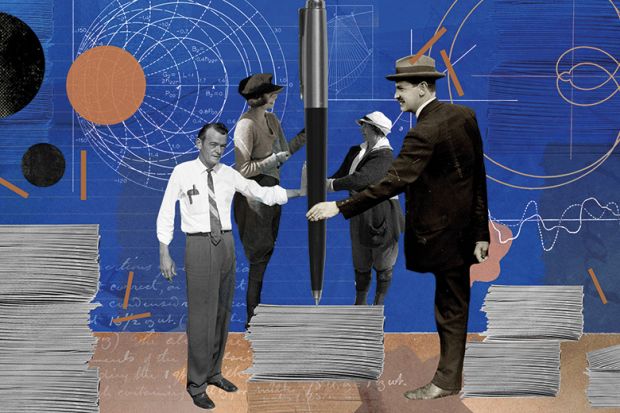A fellow professor emailed me recently: “I’m scarred by a recent authorship dispute involving a very senior academic demanding to be added to a paper in which they had played no part,” the message read.
“It got as far as two sets of lawyers before there was a back-down,” it continued.
The story struck a chord because I too had recently been a named party in a two-sets-of-lawyers interaction over what was eventually categorised as an “unfortunate misunderstanding” – namely, another professor’s strongly-held belief that his/her name (I’ll leave gender out of it for now) belonged on my papers (yes, plural).
These two altercations, each between seasoned academics of approximately equal rank and tenure, did not result in “gift” authorship. The same cannot be said of the examples I received when I raised the topic of authorship demands on Twitter. “I run workshops on publication ethics, and I’m afraid it’s common for senior academics [who have contributed nothing] to insist on authorship,” said one senior medic; while a junior academic felt just as aggrieved, stating, “My eminent professor boss often replaced my name with his on papers I wrote as I was ‘too unknown to publish’.”
“‘You use my lab’ has been an excuse I’ve seen used,” said another Twitter user; while yet another highlighted how principal investigators insist “their preferred other postdoc gets token authorship”, adding that in larger groups this can be common and hard to challenge.
Responders were quick to point out that the system itself is flawed. Many of the problems raised will be familiar to anyone who has sat on a research excellence framework panel. For example, “authorship” means different things in different fields, author order conventions differ by discipline, and there is the perennial problem of how science recognises activities that are impossible to capture in metrics. Others have rightly pointed out that if we measure an academic’s worth by the length of their publications list, we can expect some shoulder barging.
My Twitter responders suggested that authorship offences would be reduced by “transparency”, “consistency in criteria and definitions” and “clear policies”. Some proposed formal authorship frameworks such as the one used by the International Committee of Medical Journal Editors (ICMJE) or the more creative wiki-style CRediT criteria set out by CASRAI, an international non-profit membership initiative led by research institutions and based in Canada. The latter includes a suggestion for “digital badges” for online publications, with different icons denoting different kinds of contribution (“computation”, “resources”, “funding acquisition”, “data visualisation” and so on).
Notwithstanding the need to use common standards and to fix perverse incentives, the solution to the growing problem of unreasonable authorship demands is not going to come in the shape of a new set of rational criteria or standards – nor, indeed, through better policing of existing ones. That is because, at its root, the problem is not a rational one but a moral one.
In every one of the Twitter quotes above, the issue is the same: someone with more power (and knowledge of how the system works and how to avoid getting caught) was imposing an unreasonable demand for authorship on someone with less power and knowledge. In every case, I will wager, they knew exactly what they were doing.
Authorship demands from senior academics upon juniors are immoral because they are an abuse of professional power and status. They reflect something deep and dishonourable about the senior academic as a person. Those of us who aspire to behave decently towards our own juniors rarely confront colleagues whose behaviour gives cause for concern. That is partly because we rarely have incontrovertible evidence, and partly because we do not have the time. But it is also perhaps because it takes moral courage to throw down a moral challenge. It’s not like pointing out a typo.
It seems to me that things need to change. Criteria and procedures aside, I believe we need to develop an ethics of professional practice that is based on academic virtues, and which identifies and eschews academic vices.
The Hippocratic oath, which nobody takes these days and which includes outdated assumptions and phrases that would offend many feminists, nevertheless offers some lines of inspiration. Both implicitly and explicitly, it focuses on the virtues of the physician. “I will keep pure and holy both my life and my art”; “I will abstain from intentional wrongdoing and harm, especially from abusing the bodies of man or woman, bond or free.” With a bit of tweaking, this oath could be usefully recycled.
Why bother? Because, as delegates argued at an interdisciplinary workshop that I ran in 2016 with the philosopher Quassim Cassam, the implicit conflation of professional virtue with the assiduous use of tools and procedures demeans us. As academics (and doctors) know all too well, obeying procedure to the letter, without regard for the moral nuances of the individual circumstance, does not inevitably make our actions moral. Indeed, it can sometimes produce what sociologists are now calling “bureaucratic violence”.
Would a voluntary “academic oath” (perhaps covering authorship as one of several dimensions of our work) help to transform academia into a profession that is more self-consciously ethical, and which therefore sees ethical violations for what they are? And would it force academics to take such violations seriously and conduct high-level self-policing? Or would such an oath come to serve as a moral curtain behind which academia’s bullies and cowards can better hide?
I don’t know. But I think it’s time we discussed it.
Trisha Greenhalgh is professor of primary care health sciences at the University of Oxford and was deputy chair of the 2014 REF Main Panel A. She writes in a personal capacity.
后记
Print headline: A Hippocratic oath for academics might help keep scholars in line




